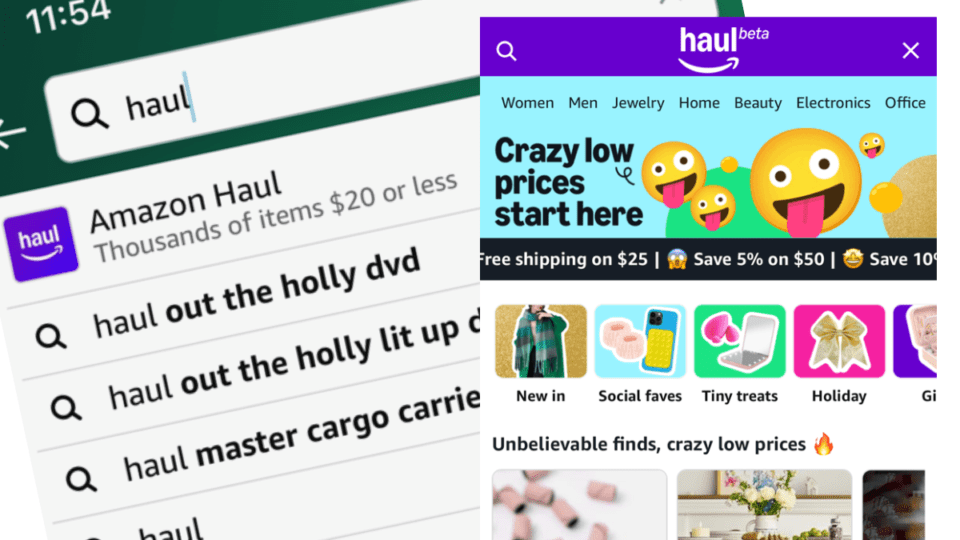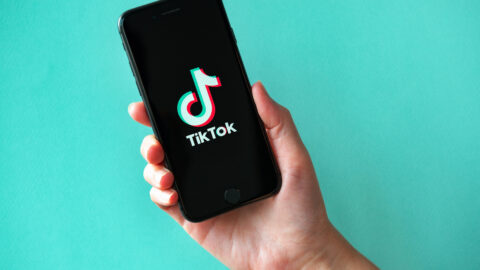The Editors’ Perspectives column offers insights and opinions from the Retail TouchPoints editorial team as they dig into the latest trends in retail, marketing and tech.
Amazon’s highly anticipated low-cost Temu competitor has arrived, and it’s called Haul. While industry insiders have been tracking the development of the discount storefront for months, consumers will likely have a bit of trouble finding it now that it’s here. Still designated as being in beta, Haul is available only on the Amazon app, and currently can only be found if you actively search for it. Not only that, but the site is siloed from the rest of Amazon.com with a separate cart and checkout.
Amazon is clearly keeping Haul at arm’s length from its core offering, and with good reason. The initiative to launch Haul was prompted by the flood of consumer enthusiasm for China-direct apps like Temu and Shein and their ultra-low prices. In order to compete, Amazon has had to swim against the tide of the consumer experience it pioneered. Yes, Haul prices are shockingly cheap (topping off at $20, with most items priced at $10 or less), but the trade-off is long shipping times and spending minimums for free shipping (no Prime free delivery here folks).
It’s a bit ironic in fact that Amazon, which for years has been lauded by customers (and blamed by brands and competing retailers) for setting sky-high consumer expectations about speed and cost of delivery, and to some extent even low prices, has now chucked it all out the window in order to compete. Which begs the question: Why?
Discount Goods Still Come with a Cost
To be sure, Amazon’s competitive hackles have been raised by the rapid adoption of Temu and Shein, not to mention the financial impact of customers flocking to alternative ecommerce platforms. But this particular form of ecommerce comes with a lot of baggage, some of it of the kind that Amazon has been trying to shed from its core business for years now (things like packaging waste, carbon emissions and IP infringement).
In fact, the China-direct apps have been a lightning rod for governmental scrutiny and regulatory action, prompted by a whole host of political and humanitarian concerns over environmental impact, forced labor, national security, counterfeiting, product safety and more. Was the threat to Amazon’s business so large that it was worth the risk of opening up even one of these very large cans of worms? The answer is clearly yes, but again, a certain hesitancy is evident in Amazon’s separation of Haul from the rest of its ecommerce business. There is a sense that Amazon wants to take a bite out of these upstarts edging in on its turf, but without risking contamination of the ecommerce powerhouse it’s spent 30 years building.
The initiative has been deemed “low risk” for Amazon by some analysts, merely “ensuring that Amazon has a competitive offering with limited financial investment.” And that is likely true — this kind of offering requires very little investment from the platform operator, particularly one like Amazon that already has all the necessary infrastructure in place. But what about reputational risk?
Americans’ trust in Amazon has been touted as a plus for the Haul experiment. Research by Omnisend found that only 7% of people said they trust Temu, but 68% still shop there; on the flip side, 86% of those surveyed said they trust Amazon. This has been interpreted by some as an indicator that Amazon should move full steam ahead — give the American people what they want from a company they have confidence in. But these China-direct products have a habit of falling short of consumer expectations and the result can be fatal for the platform that sells them, just ask Wish.
Interesting Move for a Company Known for Leading, Not Following
Amazon is known for its test-and-learn mentality. The company is not afraid to try new things and scrap them if they don’t work out. Exhibit A: Its many, mostly failed, attempts at brick-and-mortar retail. This “fail fast” ethos has benefited Amazon immensely in its three-decade career and is a large part of why the company continues to reinvent the retail landscape and serve as a vanguard of commerce excellence.
But as someone who is often a fan (both professionally and personally) of Amazon’s innovations, I can’t help but be a bit disappointed by this latest move. Amazon’s biggest strength is innovating to find new solutions, not copying others. And Haul is truly a copy of Temu and Shein, right down to the gamified, emoji-laden aesthetic.
There is also, I would like to think, a certain amount of social responsibility that comes with being one of the most powerful companies in the largest economy in the world. The rise of platforms like Shein, Temu and TikTok have raised very real concerns about the impact of commerce and media on the world and its inhabitants. Does our country really need more cheap, plastic products, produced in questionable (at best) conditions by vulnerable workers abroad?
I can only hope that Amazon fails fast in this particular endeavor so that it can get back to what it does best — raising the bar, not trying to clear someone else’s. Unfortunately, I’m not sure that American consumers will be very helpful on this front, proving as they have their insatiable appetite for cheap goods no matter the cost.













